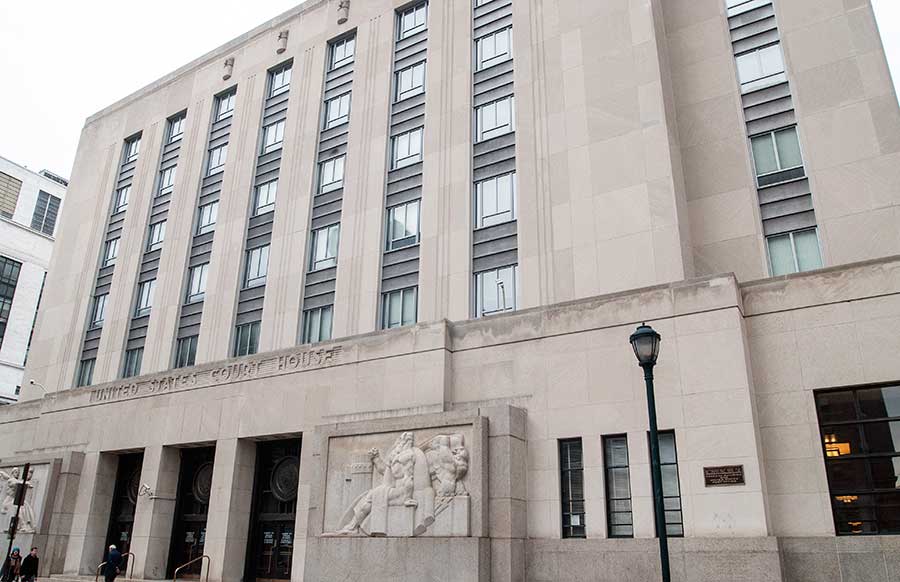
The United States Court House in Philadelphia, Pennsylvania, where the Immigration Court for the city sits. Creative Commons Attribution-NonCommercial 4.0 International License
A MEXICAN immigrant to the United States will have to wait months to find out if he will be allowed to stay under nearly 20-year-old amnesty limits.
Hermilo Ortiz Ortiz applied at the Philadelphia Immigration Court in Pennsylvania1 for a “cancellation of removal” on the grounds that he had contributed to life in the US for the past decade and his family would face extreme hardship if forced to return to Mexico.
There are only 4000 such immigration relief permissions – which can ultimately lead to a Green Card and permanent residency – granted across the entire US in any year, as set up by the legislation in 1996. Mr Ortiz will have to wait until October when the next batch of 4000 spots are released, and if the quota is already used up, he will be bumped into the next year to try again.
The 47-year-old initially lived in the US from 1997 to 2000 before returning to Mexico for a few months and arriving back in the US in May 2001, the court heard on February 9, 2015. At the time he had two children, both of whom were born in Mexico.
Since then, he and his wife have had two more children, born US citizens, and he has worked in Delaware for a concrete firm. He told the court he makes about $40,000 a year before tax and all four of his children live at home, with his wife and two oldest children working.
He was applying to be allowed to stay according to the four criteria laid out by the US Congress when they passed the Illegal Immigration Reform and Immigrant Responsibility Act of 1996 (IIRIRA):
- That the individual has resided in the US continuously for 10 years,
- That they have not been convicted of certain kinds of crime,
- The person is of good moral character,
- The person’s spouse or children, who are American, would suffer “exceptional or extremely unusual hardship” if the person was removed from the US.
In 2001 he was arrested for driving under the influence but said the case was not disposed of until 2010.
Representing the government, John Carle asked: “Why is that?”
Mr Ortiz, through the interpreter, said: “I don’t know. I never thought about it. I never received any letter that I had to appear [in court].”
He said he would only be able to make approximately $200 a month back in Mexico, that his two children aged six and 15 would be limited in how much schooling they could do and that a cousin had been murdered and other relatives kidnapped for ransom.
Mr Ortiz said he would take his wife and two American-born children back to Mexico if he had to but was unsure how they would adjust.
“They’re used to living here and I would not have the same opportunities to support them,” he said.
Following Mr Ortiz’s testimony, Mr Carle told presiding Judge Steven A Morley that the government would not be opposed to the granting of the relief from removal.
But Judge Morley explained that while he makes his decisions promptly, Mr Ortiz would not learn his fate until October when the next 4000 places get released.
He said: “Depending on how many cases have been granted in this year, you may have to wait until sometime after October 1 of 2016.
“I have no control over this. There’s a limit of 4000 of these cases granted across the US in any year. The year started on October 1, 2014 and will end September 30, 2015. You simply have to wait.
“As part of this, I’m not allowed to tell you what I plan to do with the case. The government said they have no objection to granting you the relief you seek. It’s very unusual for me to do something different from what both parties want.
“So I will certainly take that into significant consideration.”
The US immigration courts currently have a backlog of more than 400,000 cases across the US according to TRAC’s Immigration Project2, with more than 4500 pending cases in Philadelphia.
CORE PRINCIPLES APPLIED
No relevant issues on principles 1, 2, 3, 4, 5, 6, 8, 9, 10 or 11.
7. Justice must be seen to be done: Immigration courts and tribunals are rarely covered by reporters and the reportage of these samples from the day-to-day workings of the court are published to meet this principle.

